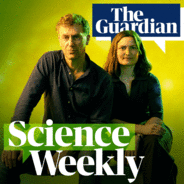Crushed by a cart, infected with parasitic worms and painful bunions caused by pointy shoes. These might sound like curses you’d wish on your worst enemy, but a group of researchers have discovered they were probably a part of normal life in medieval Cambridge. Across several archaeological sites, the team have excavated and analysed hundreds of bones to uncover the accidents and afflictions of people in the middle ages. In this Halloween special, Madeleine Finlay hears from Nicola Davis as she takes a trip to Cambridge to investigate what old skeletons can reveal about the lives of those in centuries gone by. Help support our independent journalism at theguardian.com/sciencepod

Wissenschaft & Technik
Science Weekly Folgen
Twice a week, the Guardian brings you the latest science and environment news
Folgen von Science Weekly
300 Folgen
-
Folge vom 27.10.2022Stories from a medieval graveyard: worms, wounds, and wonky toes
-
Folge vom 25.10.2022Is it ethical to put human brain cells in a rat?Researchers have successfully transplanted human neurons into the brains of rats. The recent, groundbreaking study described how the human cells took root inside the rat brains, hooked up to their blood supplies and tapped into neural circuitry. Rather than create a kind of super-rat, the ultimate aim is to better understand neuropsychiatric disorders such as epilepsy and schizophrenia, and examine the effects of drugs in real time. But do the potential benefits outweigh the ethical questions that come with combining human cells with other animals? Ian Sample speaks to Prof Julian Savulescu about how the scientists managed to transplant the neurons, what this means, and how we decide where to draw the line in such an ethically complex field of research. Help support our independent journalism at theguardian.com/sciencepod
-
Folge vom 20.10.2022Can rituals help with our grief for the natural world?Last week, a scientific assessment found wildlife populations have plunged by an average of 69% in just under 50 years. Such rapid and significant losses are leaving many of us with a deep sense of grief and anxiety. To make sense of these emotions and channel them into action, people are increasingly performing rituals and commemorative acts for the natural world. Madeleine Finlay speaks to Prof Claire White about the power of rituals in bringing us together to process grief, and hears from author Andri Magnason about why he wrote a eulogy for Okjökull, the first Icelandic glacier officially lost to the climate crisis. Help support our independent journalism at theguardian.com/sciencepod
-
Folge vom 18.10.2022How a scientific scandal could force sport to rethink concussionDr Paul McCrory is a world-renowned concussion expert whose work shaped concussion policy across global sport for the past 20 years. In his work, and through his role on the influential Concussion in Sport Group, McCrory had previously adopted a sceptical view on the link between concussions and chronic traumatic encephalopathy (CTE) – a progressive brain condition whose symptoms are similar to Alzheimer’s disease. Last week, the British Journal of Sports Medicine (BJSM) retracted nine of his articles and attached an ‘expression of concern’ to another 74. In an editorial, the BJSM, and its publisher, BMJ, stated that ‘their trust in McCrory’s work –specifically the articles that he has published as a single author – is broken’. Ian Sample speaks to senior sports writer Andy Bull about how the scandal unfolded, what it could mean for players and what is likely to happen next. Help support our independent journalism at theguardian.com/sciencepod
